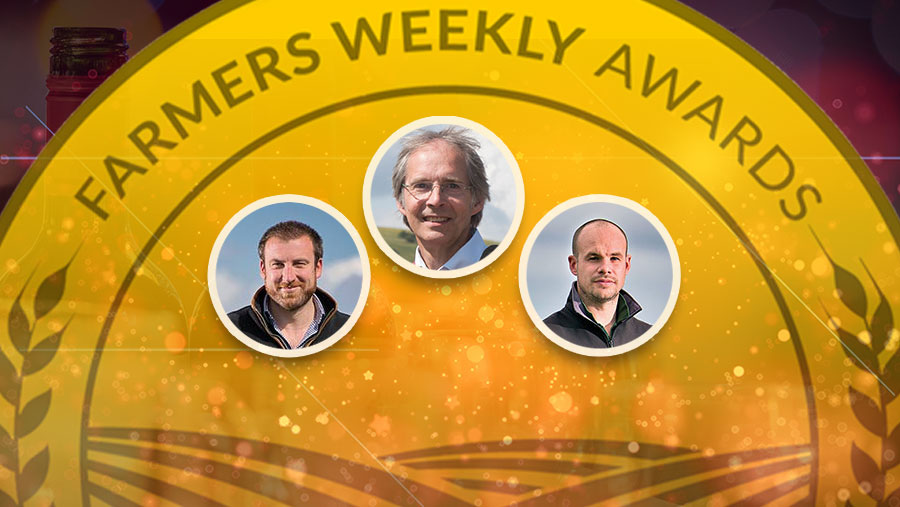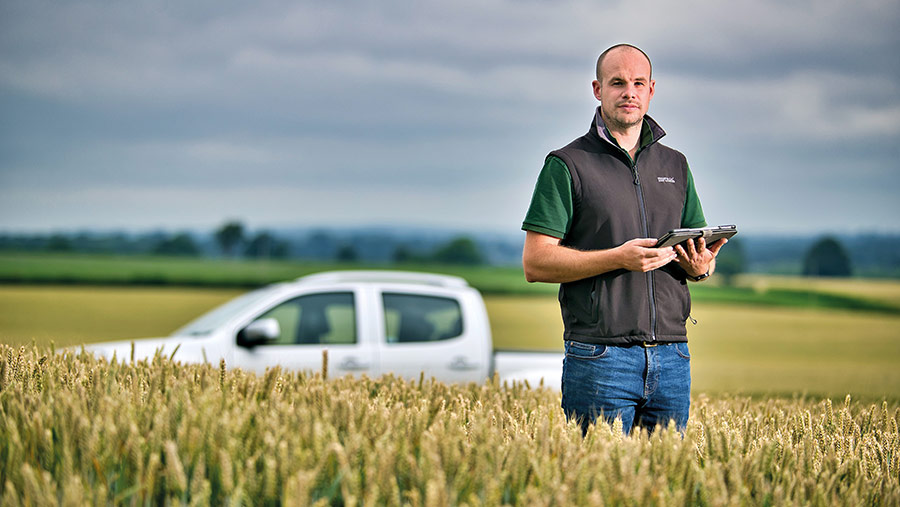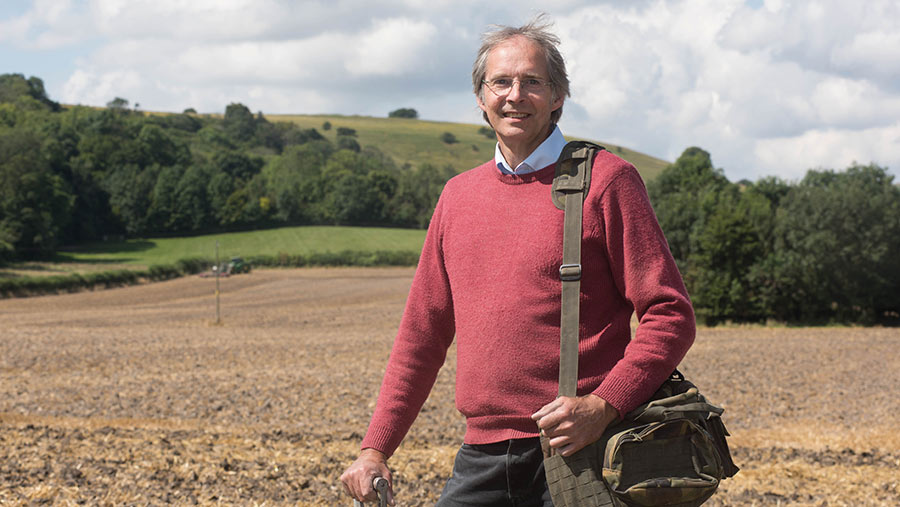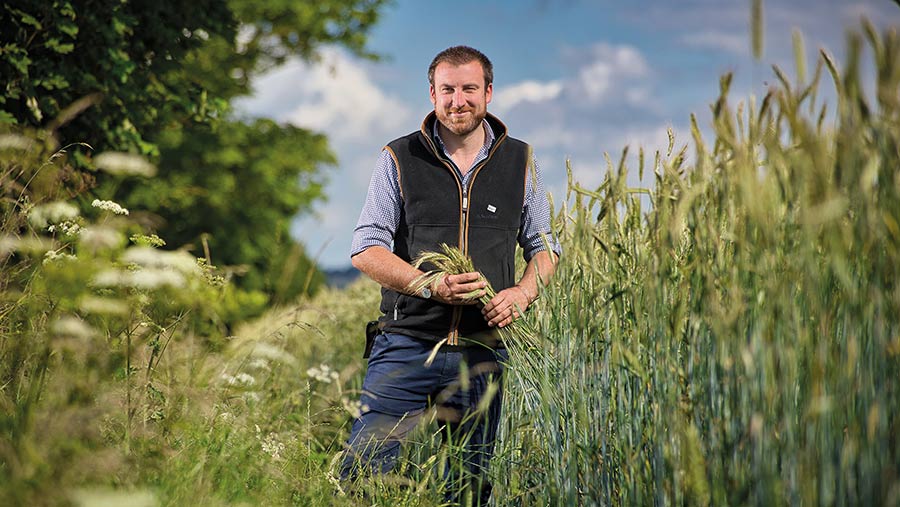Farmers Weekly Awards 2021: Arable Adviser of the Year finalists

All three agronomists competing for the biggest prize in arable advice are in the top 5% in their field and are role models for the way the industry needs to evolve to meet the changes needed in agriculture.
See also: Arable Adviser of the Year finalists 2020
The finalists
- Ed Brown
HL Hutchinson, Shropshire - Mike Harrington
Edaphos Agronomy, Oxfordshire - Kieran Walsh
Velcourt Advisory Services, Gloucestershire
The judges
- Mark Dewes
Last year’s winner - Philip Case
Farmers Weekly chief reporter - John Barrett
Director of Sentry Limited
Ed Brown
HL Hutchinson, Shropshire

Ed Brown © Richard Stanton
Ed Brown is trying out new systems to reduce the environmental impact of his clients’ farms and make them more sustainable.
A Harper Adams University graduate, Ed started out as a potato agronomist at Greenvale AP before he joined Hutchinsons in 2015, where he is now head of agroecology.
He has since built a reputation as a leading consultant in agroecology and regenerative agriculture in his trading area – mainly Shropshire, Staffordshire, but also Leicestershire and Derbyshire – as well as nationally.
The arable industry needs advisers who can help growers to build resilient, sustainable and profitable farm businesses – without subsidies – and Ed is at the forefront of this demand.
Grower advice
He is offering a service that is different to traditional agronomic advice, where chemicals are often the first choice to tackle pest or disease issues in crops.
With his emphasis on regenerative agriculture, Ed’s main focus is building healthy soils and plants that are naturally more resistant to pest and disease attack.
To achieve this, he has helped to implement several novel soil and plant management techniques and has built a template for baseline farm measurements, including soil, carbon and biodiversity.
This allows management practices to be built on and provides the opportunity to track success at a later date by remeasuring the same parameters.
Innovation
Ed is helping growers to conduct a large number of on-farm trials looking at comparisons of management practices, as well as new products and techniques.
This year, he is trialling blended wheat varieties from four breeders on six different farms alongside conventional wheat varieties, while carrying out an in-field assessment of dropping out of T1 or T2 fungicide spray timings.
He has also set up a Sustainable Soils Group of farmers interested in regenerative agriculture to enable peer-to-peer exchange on everything from soil health to cover crops and direct-drilling.
The group now consists of 35 farmers across four counties and as well as a support network, it regularly stages farm walks and talks, including external speakers.
Shropshire farmer John Bubb hired Ed as his agronomist in September 2019.
In 2020, his first year with Ed, Mr Bubb reduced his fungicide spend by half to £50/ha, but his gross margin was only £20/ha down on the previous year.
“Regenerative agriculture is a big step in the other direction from what we were doing. It’s very much low input, and maybe lower output, but maintaining the margin.” he says.
“Ed has certainly got Hutchinsons into a different frame of mind – but in a good way.”
The future
Ed hopes his client base will survive the post-Brexit transition, including reduced basic payments, and continue to work with him. But he is also turning his attention to upskill agronomists in agroecology services.
Part of his role at Hutchinsons is compiling a course for trainee agronomists to deliver his holistic approach to soil health, agroecological practices and less chemical intervention.
This is due to start this autumn. Initially, between eight and 10 people will be trained, with at least one person within each of the core regions of the UK equipped to deliver the service.
The training programme will then be rolled out more widely.
“I have spent the past few years successfully building up my portfolio of the business, and now it is time to help others deliver it,” Ed explains.
The judges say
Ed has set the agenda developing Hutchinson’s agroecology department and achieved a wide portfolio of customers within just a few years. His sustainable soils group has assembled farmers to share his common goal of regenerative agriculture and vision of farming in the future.”
Summary
The judges liked
- Agenda-setting with agroecological approach
- Passion and drive to pull together farmers for soils group
- Strong vision for future of farming
- Cutting-edge thinking
- Collaborative approach
Client farm facts
- Provides agronomic advice across 6,000ha
- Range of businesses, including arable, livestock and mixed farms
- Agronomic advice on combinable and forage crops, some root crops and vines
- Four counties covered: Shropshire, Staffordshire, Leicestershire and Derbyshire
The numbers
- 90% of all farms he advises follow agroecological principles
- 100% fee paid, de-coupled from product supply
- 20 days/year additional consultancy
Mike Harrington
Edaphos Agronomy, Oxfordshire

Mike Harrington © Hugh Nutt
Mike Harrington is leading the drive to help growers achieve sustainable, profitable, low-input farming systems.
For years, he has held a particular interest in soil health and fertility, and he promotes a more holistic system of farming with reduced reliance on chemical inputs.
Mike is director and senior agronomist at Edaphos, an independent agronomy firm that provides agronomy services to all types of farms in all situations. International travel inspired Mike to set up Edaphos in 2005.
The UK has become heavily reliant on chemicals to tackle disease or pest problems, he says. For many growers, this has led to poor soil and plant health, below-par rooting systems and less nutrient use and applying more inputs to depleted soils to find solutions.
Instead, Mike believes in a biological approach to sustainable soil systems, with less emphasis on chemicals and fertilisers. Yield, although important, is less of a focus than profit and sustainability.
He has established a second company, Aiva Fertiliser, a UK manufacturer of biostimulants, microbes and liquid fertilisers to support agronomic solutions for regenerative farming systems to increase efficiency, crop quality and yields.
Grower advice
Mike manages a team of agronomists and soil fertility consultants at Edaphos. Aiva has a separate sales team serving more than 300 clients.
Aiva has an R&D programme that focuses on field trials of new formulations on agricultural crops and differing soil types. The aim is to better understand how soil fertility and plant nutrition may be improved using novel nutrients and products.
Mike encourages growers to adopt more diverse rotations, including a better balance between autumn and spring cropping, to build soil fertility and combat weeds such as blackgrass.
Some clients have reduced chemical inputs by up to 60% and more than halved nitrogen applications, but they have maintained good yields by focusing on soil health, cover crops and direct-drilling.
Innovation
Mike constantly looks for ways to solve problems without using something that is harmful to farming systems.
For example, rather than using insecticides, he has been experimenting with orange oil to manage aphids and monosilicic acid to increase plant resilience and reduce flea beetle damage.
He has been working with growers, including Staffordshire-based farmer Tim Parton, to brew and make their own composts. This is allowing clients to drop seed dressings.
Meanwhile, Mike says using microbes to enhance soil and improve plant health is helping to keep fusarium out, rather than having to resort to fungicides.
As well as addressing the biological and chemical properties of the soil, Mike also has a focus on the physical, advising on alternative methods of establishment.
The future
Mike attaches value to peer-to-peer knowledge exchange and has set up a WhatsApp group for clients to share information.
Teaching sessions are hosted at least twice a year on farms and growers travel from across the country to take part.
In future, he plans to host regional meetings for smaller groups to get farmers thinking and allow them to go away and make decisions.
Mike is also passionate about developing new talent and has been expanding Edaphos to hire additional trainee agronomists.
The judges say
Mike has a clear passion and drive to push forward a regenerative farming agenda, but he is flexible in his approach. He has a strong track record and has developed profitable agronomy businesses.”
Summary
The judges liked
- Demonstrates passion and drive to push forward regenerative farming practices
- Flexible approach to different agronomic situations
- Passion for nurturing new talent is clear
- Generated profitable agronomy businesses
Client farm facts
- Customer base of arable, livestock and mixed farms
- 9,320ha covered across seven counties/regions
- 60% reduction in chemical inputs for some
- 50% drop in nitrogen applications for some
The numbers
- 40 years of experience in agriculture
- 25 accounts on full agronomy service (personal)
- 7 counties/regions covered personally: Oxfordshire, Berkshire, Hampshire, Wiltshire, Kent, south Wales, Northamptonshire
Kieran Walsh
Velcourt Advisory Services, Gloucestershire

Kieran Walsh © Richard Stanton
Kieran Walsh worked as a farm manager and sprayer operator before he caught the bug for crop agronomy.
He was raised in the Gloucestershire countryside, surrounded by farmland, and used to play in the fields he now walks regularly to provide arable advice to a range of clients, from beef and dairy farmers to large arable estates.
“My main goal was to do practical farming, but I realised I actually enjoyed the crop husbandry side and all the challenges that brings,” he recalls. “That fascinated me more than sitting on a tractor or sprayer.”
For Kieran, an agronomist isn’t just someone who turns up to a farm and writes a recommendation for a chemical – it’s about a whole-systems approach that focuses on maximising crop production and soil health at the lowest sustainable cost.
Grower advice
He is an independent agronomist for Velcourt Advisory Services and provides arable advice to 22 clients in Gloucestershire, Oxfordshire, Wiltshire and Dorset. He also offers strategic agronomic advice to an additional four clients.
Kieran’s approach is hands-on, progressive and collaborative, and he is passionate about agri-tech and soil health.
He likes to come up with innovative solutions, rather than just resorting to a can.
For example, when one client suffered a serious blackgrass problem when growing wheat, he ditched largely ineffective post-emergence residual herbicide options and switched to cultural controls using an inter-row hoe.
He has introduced the hoe to five other clients, who have bought their own.
“Our reliance on post-emergence grassweed control was achieving less than 10% blackgrass control for a product that was costing about £50/ha,” he says.
“A good cultural method of hoeing crops is controlling in the region of 70% of blackgrass, costing about £13-£17/ha, which is a much more sustainable option.”
Kieran has worked with clients to bring other options into cropping rotations, including hybrid ryes, triticale and grain maize to open up new markets. He facilitates to ensure the products produced on farms meet the quality of the end producer.
Innovation
Kieran managed the agronomy for Harper Adams’ Hands-Free Hectare project and its successor, the Hands-Free Farm – the world’s first fully automated farm.
Separately, he is working with a company to produce an end-to-end farm management suite, which is due to launch on a couple of farms for testing this October.
This will be an interface between different systems on the farm that will “talk” to machinery, record cropping and link to accounts packages.
The real-time farm monitoring service will provide a digital fingerprint of farming practices and costs.
It will be cloud-based and provide freedom of data to growers, landowners, farm managers, shareholders and, possibly, guest logins for external farm audits.
He is also providing expertise on a new internet of things project to set up one of the first “smart farms” in the South.
The future
Kieran says he wants to continue providing his clients with R&D-led independent agronomy that covers all aspects of inputs and outputs of farming.
He also wants to use precision software and farming platforms that bring value, and farming innovation in the form of autonomous agronomy which, in the future, may combine automated machinery and agronomy.
The judges say
Kieran demonstrates an innovative approach to agronomy and looks to provide bespoke, cost-effective solutions to the challenges facing farmers through the loss of chemistry.”
Summary
The judges liked
- Innovatory approach developing end-to-end farm management system
- Cost-effective solutions to agronomic issues
- Offers solutions to loss of chemistry and to protect soils
- Strong relationship with clients and highly valued
Client farm facts
- 22 clients, ranging from mixed farms – mainly beef and dairy – to arable estates
- Gives advice on and walks 6,200ha of land
- Four “strategic” clients that involves providing agronomy information
- 30-50% reduction in some clients’ input costs
The numbers
- 8 years working as an agronomist
- 100% R&D-led independent agronomy, covering all aspects of inputs and outputs, strategic agronomy services and farm system approach reviews
- 40% Proportion of time spent providing whole-farm approaches
- 25% Uplift in business size since going independent
Sponsor’s message
 “Arable farming continues to face evolution on many fronts, from weather events to consumer environmental awareness. Arable advisers are playing a more important role than ever ensuring that all these challenges are met.”
“Arable farming continues to face evolution on many fronts, from weather events to consumer environmental awareness. Arable advisers are playing a more important role than ever ensuring that all these challenges are met.”
Ben Agar, business development director for the UK and Ireland

